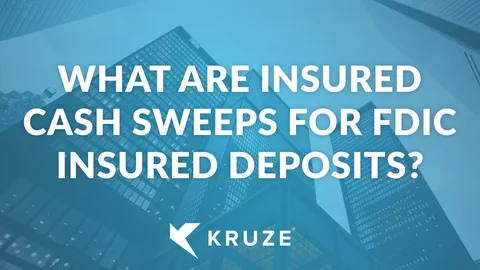
Insured Cash Sweep (ICS) accounts have been around for a while, but the recent Silicon Valley Bank (SVB) crisis has made a lot of founders look more closely at this banking option for their startups. Most banks are offering a version of ICS, either through a major network like IntraFi (which includes over 3000 banks) or through other networks set up by groups of banks. We’ve posted a list of banks and financial institutions offering variations on this service.
How Does Insured Cash Sweep Work?
These accounts allow a bank to distribute a startup’s deposits among other banks that are insured by the Federal Deposit Insurance Corporation (FDIC) to provide greater FDIC protection. FDIC insurance covers individual depositors up to $250,000, guaranteeing that in the event of a bank failure, the federal government will reimburse those depositors up to that limit.
However, many venture capital-funded startups have significantly more than a quarter of a million dollars in funding. Even smaller companies typically will have more than that in their payroll accounts. Before the SVB crisis, many founders didn’t really worry about it – after all, bank failures are rare in the US. Now, however, there’s a lot more concern about protecting funds in excess of $250,000.
Diversifying Startup Deposits Among Banks
To extend FDIC protection, ICS accounts (also called networked deposit services) place funds in increments of $250,000 throughout their networks of FDIC-insured banks. To look at a simple example, if you have $1,000,000, and place it in an ICS account, your main bank will keep $250,000, and then “syndicate out” three more deposits of $250,000 to three other FDIC-insured banks. Your main bank or financial institution does the work to distribute your deposits, and acts as a central point of contact for you to monitor and access your funds.
The idea is that if any of the banks in that network fails, your funds will be reimbursed by FDIC. Other banks in the network also place their deposits with your bank, so it’s a “quid pro quo.”
ICS Is Innovative But Untested
These types of accounts are an amazing innovation, but there is still some risk that the FDIC might not honor the insurance. Our research hasn’t found situations where networked deposit services have been tested and been recognized by the FDIC. We have not seen an FDIC statement validating ICS, but it seems likely that that the FDIC will address it soon, thanks to the explosive growth in these types of accounts following the SVB situation. We aren’t super worried about this at the moment - in fact, we talked with the leading provider of sweep products, IntraFi. Read more about our conversation, which we turned into a podcast:
Insured Cash Sweep in Action: Podcast with IntraFi
I recently spoke with Bryan Mezines, Director of Deposit Networks at IntraFi, on my podcast to learn more about how Insured Cash Sweep works in practice.
Here are some highlights of our discussion on ICS and IntraFI:
- IntraFi partners with over 3000 FDIC-insured banks to provide expanded insurance coverage. They take large deposits, divide them into FDIC-insured increments, and distribute to their network banks.
- This allows startups to keep funds in one place virtually, through their existing bank relationship, while deposits are spread out securely behind the scenes.
- IntraFi was founded by banking experts including a former Comptroller of the Currency. Their mission is to provide a stabilizing force and retain deposits in the banking system.
- Following recent large bank failures, demand has surged for Insured Cash Sweep services. Many banks are now proactively offering it to retain startup deposits on their balance sheets and recycle back into lending.
- Costs vary but are set by the startup’s existing bank. IntraFi charges that bank behind the scenes for access to the network.
- Startups can visit IntraFi’s website and use their bank locator to find options. Or, ask your current bank if they offer access to Insured Cash Sweep.
- This confirms that Insured Cash Sweep services are being widely adopted to protect startup deposits. While the FDIC guarantee is still untested for these networks, their growth highlights the need for expanded coverage.
If you have questions about startup banking options, in the wake of the SVB situation, please contact us. You’ll also find more information about startup accounting on our YouTube channel and our blog.